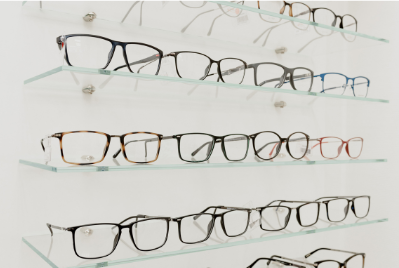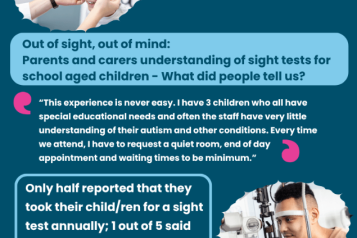Sight (eye) tests for children and young people
• How do I book a sight test for my child?
• My child is neurodiverse/has additional needs, how do I access a sight test that accommodates their needs?
• Is there any financial support available to help to pay for the test or glasses if they are needed?
• Reasons why I might need to book a sight test sooner than their 2 year check
• How can I feed back about the service we received?

Uploaded: September 2025
When should I take my child for a sight test?
It is recommended that all children have regular a sight test. Whilst the NHS doesn't say how regularly your child should have a test, the Association of British Dispensing Opticians (ABDO) - representing high street opticians - suggests every 1 to 2 years. This is to check the general health of your child's eyes and to make sure that any glasses or lenses that your child has are still the right strength.

How do I book a sight test for my child?
You can book a sight test at any community optician, some well known providers include Specsavers, Vision Express or Boots Opticians. Many high streets also have independent opticians. For more information about a children’s sight test and what happens during the test, please choose the links below:
https://www.specsavers.co.uk/eye-test/childrens-eye-test
https://www.nhs.uk/tests-and-treatments/eye-tests-in-children/
My child is neurodivergent/has additional needs, how can we access an appropriate sight test?
If your child is neurodivergent or has additional needs they may experience difficulties with certain sensory inputs, being in a busy space or being out of their routine. It is important that you think about which setting would be best for your child’s individual needs.
Children and young people who are neurodivergent or have additional needs can attend community opticians, to have their vision tested. A community optician will be able to complete a sight test on a child or young person who is unable to read or verbally communicate by adapting some of the tests. SeeAbility has a useful page which outlines what you can expect from a sight test and the adaptions that can be made to suit your child’s needs: https://www.seeability.org/eye-care/eye-tests/what-happens-eye-test.
However, if you feel that your child may need more support during a sight test than a community optician can provide, you may want to consider speaking with your GP (doctor) about a referral to an eye clinic at a local hospital.
If you are not sure which provider would be best for their needs, you can contact your GP practice or call the 0-19 helpline and discuss which option would best suit your child’s accessibility needs. More information about the 0-19 information line can be found via this link: https://www.surreycc.gov.uk/children/support-and-advice/local-offer/parents-and-carers/health/nhs-community-services-children-and-family-health-surrey
You may also want to request some reasonable adjustments are put in place to ensure your child is supported during their sight test – these can be requested when you book your appointment.
Examples of reasonable adjustments:
- Having an appointment at a quiet time of day to reduce your wait.
- Requesting to visit the place before the appointment to reduce the anxiety of visiting somewhere new.
- Request photos of the place to show your child before the appointment.
- Ask for information about what will happen during the appointment before you attend, so you can prepare your child for the test and know what will come next.
- You may also want to use a now and next board or visual timetable, to help your child process what is happening now in the test and prepare them for what will be happening next. The National Autistic Society has lots of information on visual communication aids. For more information, please visit: https://www.autism.org.uk/advice-and-guidance/topics/about-autism/autism-and-communication
- You can also request reasonable adjustments to be put in place if you are attending an appointment at a hospital eye clinic. These should be requested when booking the appointment or when you are referred to for the service.
- You may also find it useful to bring some pictures to support your child’s understanding of what happens during an eye test. SeeAbility has produced resources for people with additional needs, including Easy Read versions. For more information, visit: https://www.seeability.org/resources?resource_specialism=10.

What financial support is available?
Children and young people aged 16 and under are entitled to free NHS sight tests, which are available at most community opticians. If your child is between the ages of 16-18 and in fulltime education, they will still be entitled to a free NHS eye test.
Children under 16 and 16-18 in full time education are also entitled to an Optical voucher, to help towards the cost of glasses or contact lenses.
For more information about support for paying for sight tests and the NHS low-income scheme, please click this link: https://www.nhs.uk/nhs-services/opticians/free-nhs-eye-tests-and-optical-vouchers/
Reasons why I might need to book a sight test sooner than their 2 year check
If you notice any of the following it is recommended that your child has a sight test:
- Straining their eyes, or tilting their head to see better
- Frequently rubbing their eyes
- If they struggle to read, or need to use their finger to guide their eyes
- They seem sensitive to light or have watery eyes
- They are falling behind in school
- Frequent headaches
- A ‘turn’ in the eye or misdirection of the eyes
- Often sitting too close to a screen or holding a book close when reading
- Not doing activities which requires looking at small objects or letters vision, such as reading
- Closing one eye to see the TV or a book better
- A ‘white reflex’ in photographs could be very serious, and you should seek medical attention immediately. White reflex is an unusually pale-coloured pupil of your eye (as shown in the right photo below – the pupil area usually looks black as shown in the left photo below).

How can I feed back about the service we received?
If you are happy with the care your child received during their sight test and wish to share your feedback, this can be done by speaking directly to the provider.
If you are unhappy with the care you received during your child’s sight test you can submit a formal complaint direct to the provider or to the relevant integrated care board. For more information about making a complaint, please visit our website: https://www.healthwatchsurrey.co.uk/help-making-complaint
Alternatively, you can share your experiences, positive or negative, with us via our website. For more information, visit: https://www.healthwatchsurrey.co.uk/share-your-views
